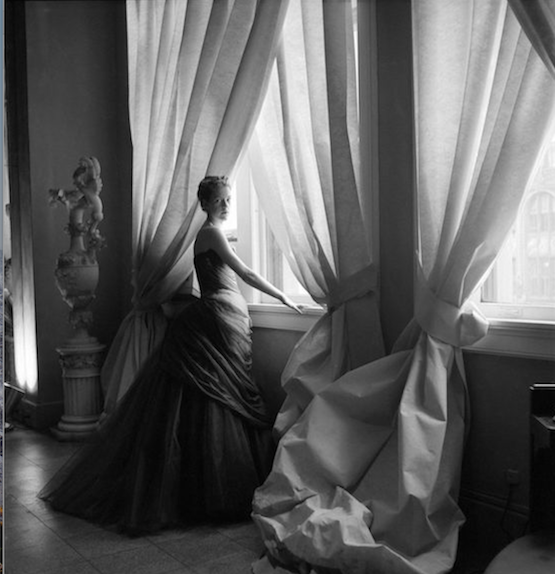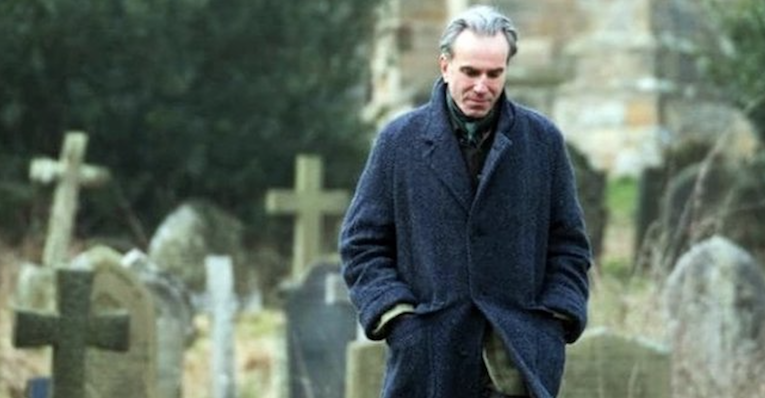 After a limited run in Kansas City, what Daniel Day-Lewis has said will be his final film has now been released on DVD…
After a limited run in Kansas City, what Daniel Day-Lewis has said will be his final film has now been released on DVD…
It’s his second collaboration with Paul Thomas Anderson as director and with music by Johnny Greenwood, of the group Radiohead.
The first was 2007’s “There will Be Blood.” Based on Upton Sinclair’s 1920’s social protest novel “Oil!”, the latter is an epic tale of Social Darwinism. PT, on the other hand, has an altogether different sensibility, even though the lead actor, director and sound track composer are all the same as in the earlier work.
“The Phantom Thread” is a tale out of Hery James, a tone poem in which an equally Darwinian struggle takes place, though the battle for supremacy goes on in two strong willed lovers’ minds.
A romantic comedy, albeit a black one, the story is set in the upper class world of London-another Jamesian echo-circa 1955.
The protagonist played by Day-Lewis (“Reynolds Woodcock”) is a high end women’s fashion designer, whose clientele is drawn from the very top drawer of International Society.
While I have limited exposure to that world, from what I have learned through Kansas City’s own contribution to this milieu, renowned interior designers Tom Britt and George Terbovich, the film rings very true. In fact, one critic says the clear model for the Lewis character was an Anglo-American couturier, Charles James, who was married to Kansas City born Nancy Lee Gregory. (Photo by Cecil Beaton,1955)
She was the sister of Masten Gregory, a Formula I driver on the European circuit at the time, racing under the name “The Kansas City Flash.”
In other words yet another local tie to the Jet Set, or as I fondly call it, ‘International White Trash’!
 At the start of the film, it’s hinted at that the aristocratic and plutocratic lovelies for whom Lewis makes clothes sometimes become “dear friends,” i.e. lovers.
At the start of the film, it’s hinted at that the aristocratic and plutocratic lovelies for whom Lewis makes clothes sometimes become “dear friends,” i.e. lovers.
This is only implied, however, with many a head fake along the way. The Day-Lewis character even goes so far as to describe himself as “a confirmed bachelor,” a well-known euphemism of the era for a gay man.
In the end, to me at least, he most resembles another top fashion designer of the day, Oleg Cassini, who was resoundingly straight and who wooed and won two of the most beautiful women ever to grace Hollywood, Gene Tierney and Grace Kelly.
Day-Lewis/Woodcock runs his fashion house out of a Georgian mansion on Fitzroy Square. The film is largely shot in an actual 18th century town house, now listed for sale for $15,000,000, in case you want to pick up a pied-a-terre in London.
As the plot unfolds, we learn that while fashion designer Woodcock does indeed like the ladies, his attitude is, shall we say, “pre-feminist.”
Not only does he bed his high end clients on occasion, he also takes in pretty young women, who are not only his fashion muses but also serve as arm-pieces and models in his atelier.
When he tires of them, he has his no-nonsense sister and business partner “Cyril” (played to perfection by Lesley Manville) show them the door, usually with a severance payment in the form of one of his costly couture dresses.
After one such parting, Woodcock heads for his country place in the Cotswolds. (Another period home, this one now an inn known as “Owlpen Manor”!)
After driving through the night he stops for breakfast at a hotel on the coast. There he sees a young waitress from the Continent (her accent and her name, “Alma,” seem vaguely German), who quickly becomes his latest muse/model/girlfriend. The breakfast scene, where he flirtatiously orders a huge trencherman’s meal from her, is the most memorable since Jack Nicholson’s legendary “Five Easy Pieces” from 1970.
The girl, played by screen newcomer Vicki Krieps, seems destined for the same fate as her predecessors, despite a hauntingly romantic beginning to their relationship. (Their first serious conversation, before a fire in a darkened room, where they learn about each other and begin to fall in love, by itself makes this one of the great date movies of all time!)
Alma, the young woman, despite the obvious disparities of power between them, soon shows she is the match of Day-Lewis’ character and will not be cast aside as easily as her predecessors.
How far she is willing to go to hold on to him is startling and what makes this a black comedy.
The acting (both by the principal characters and supporting cast), the clothes, the sets, and, above all else, the musical score by Johnny Greenwood make this a movie you will want to see again and again. After all, how many soundtracks seamlessly integrate Franz Schubert with Duke Ellington?
Moreover the plot, while ingenious, is just a vehicle for a dramatic tour of force. The movie has merit beyond a virtuoso performance of the filmmakers’ art, though.
Like most moviegoers, I particularly enjoy works that relate to experiences in my own life.
For instance, I was personally intrigued with how The Phantom Thread reflects Daniel Day-Lewis’s own intense dedication to his actor’s craft. For example, he spent a year learning to sew, even making a Balenciaga gown for his wife, in order to understand the skill and dedication that go into mastering a difficult profession.
I mention this in regard to my own life experiences because Day-Lewis, both personally and in the role he plays here, reminds me of lawyers I’ve known who sacrifice everything for their careers. (The same can be said of physicians, architects, painters, composers, or any other demanding vocation.)
I remember one lawyer in particular, a friend’s father, as I was growing up. He would come home in the middle of the afternoon, have his dinner, and then be in bed asleep by four o’clock. He would then wake up by eleven in order to be back at his office downtown by midnight for a fourteen hour stint as he prepared for a trial, a trial that might be weeks away.
I recalled the heart breaking story of Justice Charles Whitaker, the only Kansas Citian to serve on the U.S. Supreme Court. Whitaker had driven himself so relentlessly all the years he was in private practice that his health failed him when he finally realized his life-long dream of being appointed to the Court.
The character played by Day-Lewis displays the same sort of intense perfectionism that has taken him to the top of his chosen field.
However, in high fashion, just as in high finance, in the top law firms and in the highest reaches of politics and entertainment, you can never cease from unremitting effort.
Most of us admire professional success but we too often forget the considerable price it exacts, both from those who achieve it and those who love them (like the family of the nocturnal litigator!).
This may, in fact, be the real meaning of The Phantom Thread.
The title, after all, refers to the sensation 19th century seamstresses felt in their hands after sewing all day, long after they’d stopped work. It is an apt one, both as a play on words and an arresting metaphor for the cost exacted by an all-consuming calling.
The other theme of the movie that speaks to my own real life experiences is the notion that no one knows what is going on in a marriage but the two people involved.
How often have you known couples who are so different that you wonder how they can hold it together? (You don’t have to have 20 years’ experience as a divorce lawyer to have asked yourself that many times!) The Day-Lewis and Krieps characters are such a couple and director Anderson seems to be saying that if it works for them, who are we to question it?
The last persuasive evidence of the film’s worth is that it was very favorably reviewed by polar opposites politically, the hard-left Guardian and Christian right Focus On The Family. Any work of art that bridges such a cultural divide in its appeal should be considered a triumph for that reason alone.
Unfortunately, this further reflection of the film’s transcendent value is marred by the usual suspects. I’m referring to the P.C. Thought Police at The New Yorker and Variety, who have described the Day-Lewis character in The Phantom Thread as the poster child for “toxic masculinity.”
When I hear that phrase I think of Harvey Weinstein.
I think of someone who is a misogynist, who takes delight in hurting women through sexual abuse or violence. This hardly describes the Reynolds Woodcock character played by Day-Lewis, who not only loves women but dedicates his life to celebrating the feminine form with beautiful materials and design.
He speaks movingly of his love for his mother, who taught him her own trade. He reveals that he carried a lock of his late mother’s hair with him always and tells “Alma” that she should cherish her own mother while she still can.
That he is spoiled and egotistical in other relationships does not remotely make him the model of “toxic masculinity.”
In ‘The Devil Wears Prada’ Meryl Streep plays an even more obnoxious and mean spirited person, based on real life Bitch-From-Hell, Vogue Editor Anna “Nuclear” Wintour, yet no one held her up as the examplar of “toxic femininity.”
No, the Reynolds Woodcock persona simply mirrors the way many creative people (men and women) are indulged because of their genius.(Who hasn’t heard excuses made for “the artistic temperament”?)
The only thing toxic here is the political fanaticism of ideologues passing as critics, blighting and poisoning everything they touch upon in their reviews. Such carping aside, The Phantom Thread seems destined to become a classic. It will long be remembered, and not just because it is Day-Lewis’s last film.










Great review. A couple things…
I didn’t know that Anna Wintour dictated the haute couture sported by climbers at the Met Gala.
“Anna Wintour is our Fashion Pope, the infallible ruler of Vogue, fashion’s Vatican. Both because of her reputation — which is the stuff of pop-culture legend — and the reality of her power, she’s not someone anyone in the industry dares cross. When she invites you to spend $275,000 on a table at the Met Gala, you say yes. It’s quietly acknowledged that stars invited to the Met Gala do not choose their dresses or their seatmates and that every last detail must be approved by Wintour herself.”
She must loathe Sarah Jessica Parker.
https://www.instagram.com/p/Bifu1aElHuy/?utm_source=ig_embed
Her star (Wintour) is descendant. Rumors on the interweb and articles like this one, would have been apostasy just 6 months ago in ANY N.Y. publication.
https://www.thecut.com/2018/05/anna-wintour-asks-us-to-forgive-in-her-editors-letter.html
The decision in Baker V. Carr seems so obvious in retrospect. The Supreme Court seemed so much more concerned then, with the actual, real, literal translation of what the Founding Fathers intended, with honest men, like Whitaker agonizing over it, unto death.
The last paragraph in the article, put me in mind of a recent Tucker Carlson commentary.
CARLSON: In the wake of Eric Schneiderman’s resignation as attorney general of New York, some of his long-time friends on the left are professing shock.
You’ve heard them. We just can’t believe it, they say. How can a man so publicly committed to feminism beat women? It just doesn’t make sense.
But, of course, it makes perfect sense. Self-righteousness is always a marker for secret creepiness. The people yelling the loudest are usually hiding the most.
Keep that in mind the next time you hear some Democratic politician lecturing you about your moral inferiority. That’s the guy you need to watch carefully. Chances are he’s up to something awful behind closed doors.
Hypocrisy isn’t just a feature of modern liberalism. It’s the heart of modern liberalism. Ever wonder how people who advocate for abortion can say they stand for children? How a movement that demonizes an entire race can claim to oppose racism? The same way Al Gore can travel by private jet while trying to ban your SUV.
Because consistency does not matter to the left. Only virtue matters. We’re good people; therefore, we must rule. You are not; therefore, you must obey.
Al Gore doesn’t believe he’s a hypocrite. Eric Schneiderman probably doesn’t think he is either. You can’t commit sin if your intentions are pure. And liberals believe their intentions are the purest.
If that sounds like theology, and not public policy, that’s because it is theology. Modern liberalism is a religious movement. It’s a replacement for the protestant Christianity that the left worked so hard to undermine and destroy.
Liberals are speaking the language of faith, albeit a faith without god. This is the main reason that right and left talk past each other. The reason our public debates are so weird and unsatisfying.
One side arrives with facts and stats and arguments. The other brags about its decency. One side is trying to convince; the other is trying to convert.
You can be the liberal in an argument, but you can ever convince them that you won. He cares much more deeply than you do; and, therefore, he knows he’s right. By definition. And nothing can convince him otherwise.
Somewhere tonight Eric Schneiderman is marinating in his shame. Probably unshaven and alone. His career is over. His reputation is destroyed. He faces years of potential legal action. He is a broken man. He is in agony.
And yet, on some level, despite all of that, Eric Schneiderman still knows he’s a better person than you are.
“Keep that in mind the next time you hear some Democratic politician lecturing you about your moral inferiority. That’s the guy you need to watch carefully. Chances are he’s up to something awful behind closed doors.”
The word “democrat” in your statement is interchangeable with “Republican”. The bible-thumpers of the world that scream from the top of their soap boxes about morality, the sin of homosexuality, the scourge of abortion, the immoral act of adultery, Sex outside of marriage, et al, are the EXACT people that get caught with their proverbial pants down time after time.
Politicians are the very definition of hypocrisy. ALL politicians. Left or Right, there isn’t a single one that holds the high ground.
Ok. Probably right.
This part of his comment, is what really caught my attention and rings true to me.
“If that sounds like theology, and not public policy, that’s because it is theology. Modern liberalism is a religious movement. It’s a replacement for the protestant Christianity that the left worked so hard to undermine and destroy.
Liberals are speaking the language of faith, albeit a faith without god. This is the main reason that right and left talk past each other. The reason our public debates are so weird and unsatisfying.
One side arrives with facts and stats and arguments. The other brags about its decency. One side is trying to convince; the other is trying to convert.
You can be the liberal in an argument, but you can ever convince them that you won. He cares much more deeply than you do; and, therefore, he knows he’s right. By definition. And nothing can convince him otherwise.”
Some iffy syntax there, but, he is saying that hubris, sanctimony and emotion, are more important to Liberals, who assume, always, the high ground, than facts.
This Liberal Professor, again, on Tucker, makes the argument far more eloquently than I do.
http://www.foxnews.com/shows/tucker-carlson-tonight.html
Oh…, one more thing.
You’re not allowed to “culturally appropriate”, even here, on kcc.
I was born and raised in Ruskin Heights. I know “White Trash”. I served with “White Trash”. I am “White Trash” and you sir, are not “White Trash”.
When I go outside and look next door I see “Muddin” going on and hear country music/Southern rock playing.
My neighbors have hunting dogs caged up in the backyard.
I have duct tape on everything (That I buy from Sutherlands.)
I could go on…
An exceptional effort Dwight. Rich in insight and analysis. I hope you are mulling over your next contribution here, regardless of topic.